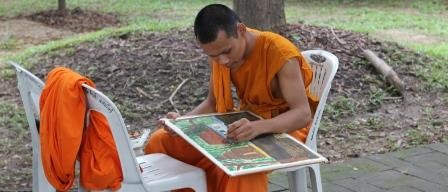Buddhism, Humanities and Ethnographic Methods
University of Vermont, Friday April 29-Saturday April 30
Sponsored by the University of Vermont Humanities Center, Department of Religion, Asian Studies Program.
Friday, April 29 4 PM, Waterman Meorial Lounge
Title TBA
Mark Rowe, Associate Professor, Department of Religious Studies
McMaster University
Claire M. Lintilhac Speaker, Asian Studies Program, University of Vermont
Saturday, April 30: Waterman Manor 427
8:30-9 arrival
9:00-10:30 Session one: Gaps and Spaces – Emerging Ethnographic Fields in the Study of Buddhism
Sean Ashley, Capilano University, “Isn’t making merit fun?”: The Playful side of Theravada Buddhism
Nicholas Sihlé, Center for Himalayan Studies, CNRS, :The local/regional emergence of a new category of Tibetan Buddhist religious actors: ngakma (non-monastic female tantric practitioners in Repkong”
Keziah Wallis, University of Otago, Vessels of the Dhamma: Thinking outside the square regarding Buddhism in Myanmar
10:30-11 Break
11-12:30 Session two: Positionality of the Ethnographer
Gareth Fisher, Syracuse University, “Who Needs Key Informants? What I Learned from the Monk who Kept Saying No”
Michelle Sorensen, Western Carolina University, “Politics and Poetics in the Field: On Conducting Research with Female Practitioners of Buddhist Chöd”
Sara Ann Swenson, Syracuse University, “’Friending’ Buddhists in the Field: Using Social Media as an Ethnographic Method”
Lunch 12:30-1:30
1:30-3: Session 3: Senses and Sensibilities
Felicity Aulino, “Love and Compassion, Pity and Distraction: An Ethnographic View of ‘Metta’ and ‘Karuna’ in Lay Thai Buddhism”
Julia Cassaniti, Washington State University, “Ethnographies of Affect in Buddhist Communities”
Darcie DeAngelo, McGill University, “Beyond Words: Sensory Ethnography and Buddhism in a Cambodian Minefield”
3-3:30 break
3:30-5:30 Session four/five: Knowledge, Discipline and the Study of Buddhism
Sue Darlington, Hampshire College, “The Word or the Deed: Beyond the Philosophical Debate of Buddhism and Ecology”
Erick White, Cornell University, “Opportunities and Challenges in the Ethnography of Buddhism: the View from Anthropology”
Dinner: TBA
